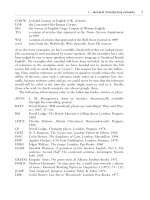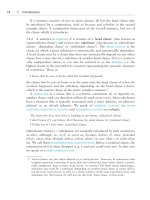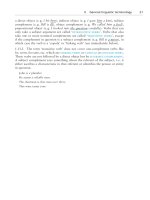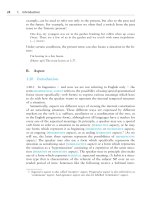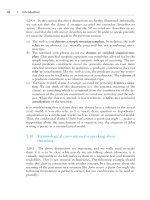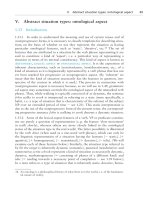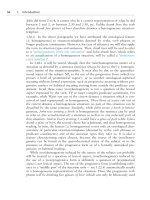The grammar of the english verb phrase part 50 ppsx
Bạn đang xem bản rút gọn của tài liệu. Xem và tải ngay bản đầy đủ của tài liệu tại đây (73.63 KB, 7 trang )
336 7. Absolute tense forms referring to the post-present
Abstract
In the preceding four chapters, we dealt with the
meanings and uses of three absolute tenses (ϭ
tenses that relate a situation time directly to the
temporal zero-point), viz. the present tense, the
past tense (or preterite) and the present perfect,
and with some principles underlying the choice
between the preterite and the present perfect. In
this chapter, we examine the fourth absolute
tense, viz. the future tense. We also consider
other verb forms that have an element of future
time reference as part of their semantics.
In section I (7.1Ϫ7.6) we first deal with the
distinction between ‘future tense’ forms and
what we call ‘futurish’ forms, the latter of which
do not express pure future and combine future
time reference with present time reference.
Section II (7.7Ϫ7.12) provides some com-
ments on be going to, which wavers between a
futurish auxiliary and a future tense auxiliary,
depending on whether it expresses the idea that
a future situation is predictable because of pres-
ent indications (e. g. My little girl is going to be
very clever) or whether it is a more neutral
means of referring to the future (e. g. It’s going
to rain tomorrow). This section also deals,
among other things, with the use of be going to
to express a present intention (e. g. Cheryl is go-
ing to marry Gordon when she has graduated).
Section III discusses some further futurish
forms, including (among others) ‘will ϩ be
Verb-ing’ (used without progressive meaning),
the auxiliary be about to, and the auxiliary be
to.
I. ‘Future tense’ forms vs ‘futurish’ forms 337
I. ‘Future tense’ forms
vs
‘futurish’ forms
7.1 Definition of ‘future tense’
The future tense locates a situation time in the post-present and normally expresses
‘pure future’. ‘Futurish forms’ are not future tense forms and do not express pure fu-
ture.
7.1.1 The
future tense refers to the post-present in the sense that it locates
a situation time (ϭ the time of a ‘predicated’ situation Ϫ see 2.12Ϫ13) in the
post-present zone of the present time-sphere. In English, future tense forms are
not built by means of a special suffix but by means of the present tense of one
of the auxiliaries will or shall (the latter in the first person only) or of the semi-
auxiliary be going to (which, however, can also be used as a ‘futurish form’ Ϫ
see 2.9 and 7.8Ϫ9). For example:
According to the weather forecast it {will / is going to} rain tomorrow.
We {shall / will} all die Ϫ one day.
It is typical of the future tense that the speaker merely makes a prediction, i. e.
he just expresses what he thinks will happen in the post-present. In the litera-
ture this is known as the expression of ‘
pure future’.
7.1.2 ‘
Futurish forms’ (see 2.9 and 7.3) are not future tense forms. For one
thing, they do not express pure future. For another, they combine reference to
a post-present actualization with a sense of present judgement. Moreover, some
of them (viz. progressive and nonprogressive present tense forms) basically
refer to the present. Their use as a futurish form is a metaphorical extension
of this (i. e. a ‘shift of temporal perspective’ Ϫ see 2.20): the post-present is
treated as if it were the present. For example:
I’m leaving. (The reference is to a situation which is either actualizing at t
0
or arran-
ged to actualize in the post-present. The latter interpretation is an example of how
a post-present situation is represented as if it were actualizing at t
0
. This interpreta-
tion is marked in that it requires a contextual or pragmatic indication that the refer-
ence is not to the present.)
[I’ve bought some paint because] I’m going to redecorate my bedroom. (The refer-
ence is to a post-present actualization based on a present intention.)
338 7. Absolute tense forms referring to the post-present
7.2 Dual time conceptualization in sentences referring to
the post-present
In 6.1.2 we noticed that the difference between the ‘indefinite present perfect’
and the past tense is that the speaker is concerned with NOW and THEN,
respectively. This means that there is a dual time conceptualization in the mean-
ing of the indefinite present perfect: while referring to a bygone situation, the
speaker is actually thinking of the present. This dual time conceptualization
can actually become dual time reference, when both times are specified by
different Adv-times, as in Now we have sold forty-three cakes since the fair
started. There can also be dual time reference when the future tense is used in
combination with a present time adverbial, witness examples like Now we
won’t have any wine when Uncle Gre
´
goire arrives. In this example now refers
to a present state of affairs and is equivalent to something like ‘Now that X
has happened …’. (This is a different kind of now from the one in Now we
have sold forty-three cakes since … This explains why we can also say We
have now sold forty-three cakes since …, but hardly
?
We won’t now have
any wine when … However, the two examples do illustrate a kind of dual
time reference.)
When there is no time-specifying adverbial referring to the present, the sense
of present time reference in sentences in the future tense is restricted to the
idea that the speaker makes a prediction at t
0
: he just expresses what he thinks
will happen in the post-present. The temporal focus of the future tense is then
clearly on the post-present time of actualization rather than on t
0
. This means
that we can no longer speak of dual time reference.
7.3 ‘Futurish’ tense forms
In Meg {is leaving / is going to leave / is to leave / leaves} tomorrow, a ‘futurish’ tense
form is used. Such forms differ from future tense forms in that they effect dual time
reference, viz. a combination of future time reference and present time reference. Be
going to can be used to build such a futurish tense form, but it may also form part of
a future tense form. In the latter case it refers exclusively to the post-present, just like
the future tense auxiliary will.
7.3.1 As noted in 7.1.2, apart from the future tense, there are other expres-
sions referring to the possible actualization of a situation in the post-present.
However, they differ from the future tense in that, even in the absence of future
time adverbials, they effect dual time reference, viz. a combination of future
I. ‘Future tense’ forms vs ‘futurish’ forms 339
time reference and present time reference Ϫ see 7.2. In fact, the idea of present
time reference is at least as salient as the idea of post-present actualization:
The train leaves at 7.12 tonight. (reference to present scheduling)
I’m seeing her tomorrow. (reference to a present arrangement, intention, pro-
gramme…)
I’m going to give up my job. (reference to a present intention)
In examples like the following, the element of present time reference is even
more salient:
The President is to visit Rome next week. (ϭ There exists a present arrangement for
the President to visit Rome next week.)
[Look out!] The milk is about to boil over. (The speaker is referring to the present
state of the milk, which forebodes boiling over.)
Bill is on the point of having a nervous breakdown. (The speaker is referring to Bill’s
present state of mind, which forebodes a nervous breakdown.)
However, there is a clear sense of post-present actualization in all of the above
examples, which is sufficient for them to establish a post-present ‘temporal
domain’ (see 2.15.4). The ‘central orientation time’ of this domain is the time
of actualization of the situation referred to by the predicate whose verb form
is leaves, am seeing, give up, visit, boil over and having, respectively. For ease
of reference, we will refer to the complete verb forms (e. g. am going to give up)
as ‘
futurish forms’. As we will see in 10.1, a post-present temporal domain
established by a futurish form is expanded in exactly the same way as a post-
present domain created by a future tense form.
7.3.2 The futurish auxiliary be going to is a borderline case as far as dual
time reference is concerned. In most cases the speaker’s main concern is with
the present cause or origin of the post-present actualization of a situation.
For example:
My little girl is going to be very clever. (ϭ ‘There are present indications that my
little girl will turn out to be clever.’)
[This is so important that] I’m going to do it myself. (emphasis on my present inten-
tion)
However, there are also examples in which the post-present time of actualiza-
tion is much more salient than the present (e. g. It is going to rain tomorrow),
in which case the difference between be going to and will is less pronounced:
whereas the latter expresses a prediction, be going to seems to be a means of
talking about the future in a neutral way. Compare:
It will rain tomorrow. (present prediction about the post-present: sort of prophesy)
It’s going to rain tomorrow. (either a prediction based on present evidence or a
neutral statement about the post-present)
340 7. Absolute tense forms referring to the post-present
It is going to rain soon. [I just know it. Not predictive weather skills, just long,
damp experience.] (www) (relatively neutral statement about the post-present)
There is hardly any difference of meaning between the following, because of
the question format:
What’ll happen next?
What’s going to happen next? Are those men going to kill us?
Both questions treat the addressee as somehow knowing something about the
future that the speaker does not know. The prediction element of will is not
salient and so does not have much semantic weight here. Be going to does not
have the connotation that characterizes it as a futurish form, viz. the idea that
the post-present actualization depends on a present intention or otherwise has
its roots in the present. So both will and be going to refer to the post-present
in a neutral way. In this case be going to is no longer a futurish form with dual
time reference but can be considered as an alternative to will, i. e. as a future
tense auxiliary.
7.3.3 The distribution of the future tense and the various futurish forms (with
their typical connotations) will be discussed in 7.7Ϫ16 below.
7.4 Modal implication: not-yet-factual-at-t
0
Any sentence referring to the post-present is modalized because it refers to something
that is ‘not-yet-factual’ at t
0
.
A situation whose actualization is located in the post-present is ‘
not-yet-fac-
tual-at-
t
0
’: the actualization is not yet a fact at t
0
, and has not even started to
become a fact at t
0
. This means that, synchronically speaking, the future tense
is a ‘modalized’ tense, i. e. a tense with a modal implication. However, it is
first and foremost a tense, not (as is often claimed in the literature) a mood:
its basic function is to locate a situation in time, and in doing so it automati-
cally expresses the modal connotation of not-yet-factuality-at-t
0
. In other
words, the future tense satisfies our definition of tense (see 2.1 and 2.7): it is
the correlation between a particular temporal meaning (‘The situation time is
located posterior to t
0
’) and a formal expression of this.
7.5 The distribution of shall and will in the future tense
7.5.1 The future tense is normally built with will. Shall is possible only in the
first person, where it is a formal alternative to will. It is rare in spoken Br. E.
I. ‘Future tense’ forms vs ‘futurish’ forms 341
and very rare in colloquial Am. E. It is not normally used when the subject is
both of us, all of us, none of us, some of us, etc., even though these are expres-
sions of the first person, nor after subjects that are coordinated NPs with a first
person pronoun as one of its constituents (e. g. You and I, We or they, etc.).
1
Both of us {will / *shall} be in trouble if she does not keep her mouth shut.
You and I {will / *shall} probably go our own ways after college.
My wife and myself {will / *shall} join the rest of the company later.
7.5.2 The above mentioned distribution also holds for shall and will in the
future perfect and for the (nonmodal) conditional tense auxiliaries should
and would.
By that time I {will / shall} have left the building.
By that time she {will / #shall} have left the building. (Shall could only be used as
a modal auxiliary expressing a command.)
I told him what I {would / (should)} do about it. (Should can be interpreted either
as a tense auxiliary or as a modal expression of advice, duty, moral obligation, etc.)
She told him what she {would / #should} do about it. (Should could only be inter-
preted as a modal expression of advice, duty, moral obligation, etc.)
[I realized that] I {would / should} probably have left the building before 5 p.m.
(Should can be interpreted as a tense auxuliary or as a modal auxiliary.)
[I realized that] she {would / #should} probably have left the building before 5 p.m.
(Should can only be interpreted as a modal auxiliary.)
[We knew that] both of us {would / *should} be shot because of what we had done.
(Should is not normally used as tense auxiliary after a first person subject like both of us.)
Of course, the distinction is obscured when the contracted form ’ll or ’d is used.
7.6 The various meanings of shall and will
As tense auxiliaries, shall and will express pure future, i. e. they convey a sense of
neutral prediction.
1. Occasional exceptions can be found, but these may be instances of hypercorrection.
(Shall was, and perhaps is still, considered by some to be the ‘correct’ first person form.)
My wife and I shall be only too pleased to take advantage of your offers to prospective
customers. (www)
[The idea of just solo rep. in a recital is also relatively new, it used to be that you
would go to a concert, hear a symphony, a sonata and a trio all in the same concert.]
Now the two of us shall be crucified for our elitist theories. (www)
342 7. Absolute tense forms referring to the post-present
7.6.1 Shall and will can both be used not only as future tense auxiliaries but
also as modal auxiliaries. As tense auxiliaries they locate a situation time in
the post-present and in doing so express one of the related ideas ‘
pure future’,
‘
prediction’or‘predictability’ Ϫ see 2.8.2. This means that the speaker
merely predicts something or assumes that something is likely to happen: he
does not represent the post-present actualization of the situation as determined
by present circumstances, such as the present volition or intention of the subject
of the sentence or a present possibility, necessity, arrangement, etc. (As noted
in 7.3.1, this emphasis on the present is typical of ‘futurish forms’.) This sense
of
pure future or neutral prediction without attitudinal implications is
clearest when the post-present actualization depends upon external factors.
This is the case, for example, in the head clause of sentences containing or
implying a conditional or temporal clause referring to a situation that has not
yet actualized at t
0
.
We’ll go camping next week if the weather is fine.
You’ll change your mind after you’ve read this letter. (implies an as yet unfulfilled
condition: if you read this letter, then you’ll change your mind)
I’ll tell her everything about it when she comes tomorrow.
[Don’t go near the puma.] It’ll bite you. (implicit condition: if you go near it)
[Why don’t you invite a couple of friends?] It’ll cheer you up. (implicit condition: if
you invite them)
Tomorrow it will be rainy but warm. (In weather forecasts the predicted situation
by definition does not depend on anybody’s volition or intention.)
Shall and will can be used as modal auxiliaries expressing some kind of volition. There
are a few constructions in which this interpretation comes to the fore and in which
futurity is therefore better expressed by other means.
7.6.2 When used as modal auxiliaries (rather than future tense auxiliaries),
shall and will can express various meanings that have to do with volition.
According to context, they can express willingness, a promise, a desire, a wish,
a threat, a warning, an intention, insistence, determination, etc. In contexts
inviting one of these modal interpretations, shall or will will be avoided if the
speaker just wishes to express pure future. The following are some typical
examples of this.
(a) In questions, ‘shall I/we ϩ the present infinitive of an intentional (agentive)
verb’ is used to inquire about a person’s will. The unmarked interpretation
of this construction is therefore that of a suggestion or offer of service. It


